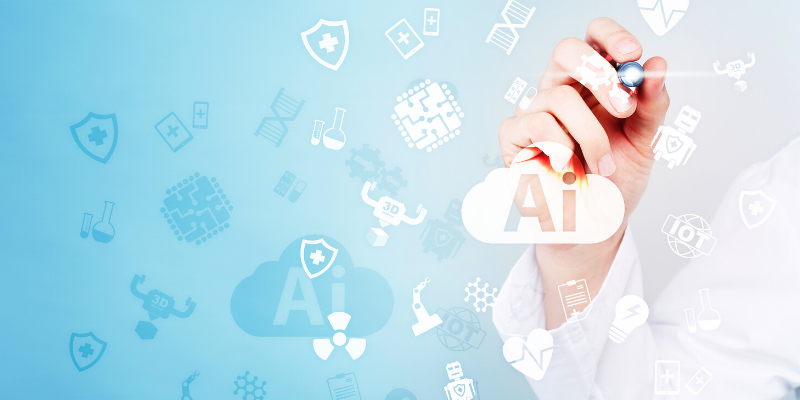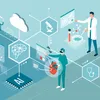
As the world grapples with a new way of life and the COVID-19 crisis peaks, its impact on everyone’s mental and physical health is indescribable.
The pandemic is not only creating a major impact on the global economy, it is also helping to accelerate the development and commercialisation of several emerging technologies that previously received lukewarm consumer response. This is predominantly accurate for innovations that reduce human-to-human contact, automate processes, and increase productivity amid social distancing.
With Artificial intelligence (AI) and Internet of Things (IoT) rapidly gaining ground in varying forms and degrees, the use of these innovation has begun to appear in a wide spectrum of technologies - from the phones we use to communicate to the supply chains that bring goods to market. It is modifying the way we interact, consume information, and obtain goods and services.
Healthcare is no exception to this new disruption. In the medical industry, the impact of AI, IoT, and other technologies through natural language processing (NLP) and machine learning (ML), is transforming care delivery.
Data suggests that AI simplifies the lives of patients, doctors, and hospital administrators by performing tasks that are typically done by humans, but in less time and at a fraction of the cost.
It allows patients to track their ultrasounds, thermometers, glucose monitors, electrocardiograms, etc., by being connected through technologies like AI and IoT. These are reinventing and reinvigorating modern healthcare through machines that can predict, comprehend, learn, and act.
A major trend in medicine, when it comes to AI, is using deep learning in medical diagnosis to detect cancer. A recent study published in the Journal of the National Cancer Institute shows that the AI system has achieved a breast cancer detection accuracy comparable to an average breast radiologist.
With the ability of AI networks to train radiologists, there are chances that their performance will be significantly improved in the nearest future.
Another promising implementation is the use of AI and the Internet of Medical Things in consumer health applications, which allows them to gather healthcare data and process the information and offer adjustments to the current lifestyle of a patient.
Its major purpose is to improve the hospital room experience and simplify the process of preparing patients to continue their healing at home. Also, virtual nurses reduce patient anxiety, improve safety, keep people entertained, and increase patient satisfaction with medical services.
When it comes to medical diagnosis, doctors have seen that applying AI & IoT to medical diagnosis provides numerous benefits to the healthcare industry. AI and IoT based software can tell whether a patient has a certain disease even before evident symptoms appear.
But what AI is extensively helping doctors in is the ease that it is providing in classifying diseases. With deep learning technologies that analyse images and recognise patterns, it is creating a huge potential in generating algorithms that are helping healthcare officials in diagnosing diseases faster.
Moreover, research suggests that AI-driven software can be programmed to accurately spot signs of a certain disease in medical images such as MRIs, X-rays, and CT scans. Existing similar solutions already use AI for cancer diagnosis by processing photos of skin lesions.
By using such tools, doctors are able to diagnose patients more accurately and prescribe the most suitable treatment for them at an earlier stage, resulting in increasing the chances of cancer prevention.
Henceforth, we can say that from patient and self-service to chatbots, computer-aided detection (CAD) systems for diagnosis, and image data analysis to identify candidate molecules in drug discovery, AI, IoT and other technologies are already at work.
They are swiftly helping in increasing convenience and efficiency, reducing costs and errors, and generally making it easier for more patients to receive the healthcare they need. While each technology can contribute significant value alone, the larger potential lies in the synergies generated by using them together across the entire patient journey, from diagnoses to treatment, to ongoing health maintenance.
It can easily be said that AI and IoT solutions can lead to better care outcomes and improve the productivity and efficiency of care delivery. They can also improve the day-to-day life of healthcare practitioners, letting them spend more time looking after patients, and in doing so, raise staff morale and improve retention.
It can even offer life-saving treatments to markets faster. With the increased use of AI and IoT in healthcare, it will certainly influence the types of new entrants into the healthcare industry as well as influence how providers, clinicians, and other staff will work in the future.
In India, the last five years have seen consumer-facing ‘health tech’ being talked about and embraced by investors, government, and gradually by the public. Among educated consumers in urban areas, technology is largely gaining traction through online health service aggregators, telemedicine, e-pharmacies, and a few fitness apps. Existing methods are also being used to reinvent healthcare delivery in the form of online consults or chat-based basic healthcare service apps, especially during these unprecedented times.
From a social viewpoint, building greater trust in AI and protecting personal healthcare data will continue to be among the universal challenges. From an administrative standpoint, making it easier for AI to integrate with existing technology infrastructure will certainly help adoption.
For our country, we can conclude that these advanced technologies in healthcare are helping expand the human capacity rather than replacing human labour altogether. Putting us in a unique position to be the driver for AI and IoT technologies in healthcare space for national and international companies.
With large amounts of data and a burgeoning startup community, India has the opportunity to address many healthcare-related problems by using them. With new disruptions in healthcare innovations, we will soon be in a position to realise the benefits of these technologies on health outcomes.
Irrespective of a patient’s location or condition, an evolution of the AI, IoT, IoMT ecosystem will become progressively impactful. And even the most remote locations will benefit from better access to care as connected medical devices continue to find their way into the hands of both patients and clinicians.
Connected health and Artificial intelligence in healthcare is no more a thing of the future, it is slowly transforming the ‘now’ that we are living in.
(Edited by Megha Reddy)
(Disclaimer: The views and opinions expressed in this article are those of the author and do not necessarily reflect the views of YourStory.)
Want to make your startup journey smooth? YS Education brings a comprehensive Funding Course, where you also get a chance to pitch your business plan to top investors. Click here to know more.
Link : https://yourstory.com/2020/07/connected-health-artificial-intelligence-healthcare-industry
Author :- Haruto Iwata ( )
July 21, 2020 at 10:28AM
YourStory


Thank you for this blog. That's all I can say. You most definitely have made this blog into something thats eye opening and important. You clearly know so much about the subject, you've covered so many bases. Great stuff from this part of the internet. Again, thank you for this blog. the future of robotics and artificial intelligence “Nice Post. It’s really a very good article. I noticed all your important points. Thanks"
ReplyDelete